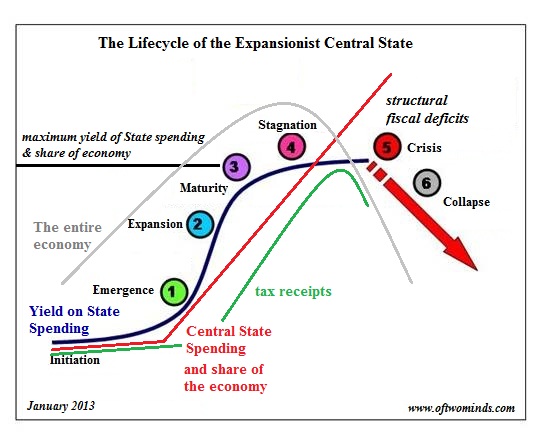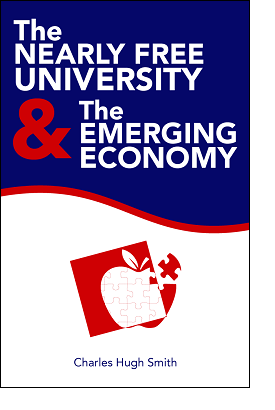The Incompetence of the Federal Reserve and Deep State Is Unavoidable
It's not the managers who are incompetent, it's the organization itself that is incompetent.
I received a number of interesting reader responses to my previous entries on the incompetence of the Federal Reserve and the Deep State:
The Federal Reserve: Masters of the Universe or Trapped Incompetents? (March 21, 2014)
Why Is Our Government (and Deep State) So Incompetent? (March 6, 2014)
Some readers thought I was underestimating the power of these institutions to pursue essentially unlimited money-printing and related global strategies.
While I understand the apparent power of unlimited money-printing and global Empire, my point (poorly articulated the first time around) was this:
The incompetence of these organizations is not a reflection of the competence or intelligence of their managers--it is the intrinsic consequence of their limited control of complex systems. If the system has reached the point of being ungovernable, even the most brilliant and experienced managers will fail because it's not the managers who are incompetent, it's the organization itself that is incompetent.
If we boil down the Fed's vaunted god-like powers, they can be reduced to four
levers: lower interest rates by purchasing interest-bearing assets, create the money to buy the assets, make free money (zero interest or near-zero interest) available to the global banking sector via lines of credit, and support/rig currency, bond and stock markets with purchases made directly or through proxies. (Thank you, correspondent Mike L., for reminding me about the Working Group on Financial Markets and the Exchange Stabilization Fund.)
That's it. Everything else is window-dressing.
Is it even plausible that any organization can control an immensely complex economy with four levers? The Fed's four levers exert no control over how much money is borrowed from the Fed or what insanely risky speculations and malinvestments the borrowed money funds.
The Fed can't even control if the free money stays in the U.S.; by one estimate, fully 60% of the Fed's free money has left the U.S. for higher-interest carry trades and speculations in the emerging economies.
The levers of power wielded by the centralized Fed and Deep State are too clumsy and limited to control a complex system at any useful level. The Fed, the Federal government and the deep State are all the wrong unit size.
This excerpt from Preparing for the Twenty-First Century by Paul Kennedy (1993) explains why:
The key autonomous actor in political and international affairs for the past few centuries (the nation-state) appears not just to be losing its control and integrity, but to be the wrong sort of unit to handle the newer circumstances. For some problems, it is too large to operate effectively; for others, it is too small. In consequence there are pressures for the "relocation of authority" both upward and downward, creating structures that might respond better to today's and tomorrow's forces of change.All these centralized concentrations of power have moved into the diminishing returns phase of the S-Curve. As the unintended consequences of their efforts to manage complex systems with their clumsy, limited tools pile up, their profound failure of imagination kicks in and they do more of what has already failed.

The structural incompetence of centralized, wrong-unit-size agencies and central banks is global: the centralized strategies of China, Japan, the European Union and yes, Russia, too, will all fail for the same reasons: organizations with a few limited controls are intrinsically incapable of managing complex systems.
The Global Status Quo Strategy: Do More of What Has Failed Spectacularly (April 23, 2013)
The Master Narrative Nobody Dares Admit: Centralization Has Failed (June 21, 2012)
"Do you know what amazes me more than anything else? The impotence of force to organize anything." (Napoleon Bonaparte)
The Nearly Free University and The Emerging Economy:
The Revolution in Higher Education
Reconnecting higher education, livelihoods and the economy
With the soaring cost of higher education, has the value a college degree been turned upside down? College tuition and fees are up 1000% since 1980. Half of all recent college graduates are jobless or underemployed, revealing a deep disconnect between higher education and the job market.
It is no surprise everyone is asking: Where is the return on investment? Is the assumption that higher education returns greater prosperity no longer true? And if this is the case, how does this impact you, your children and grandchildren?

We must thoroughly understand the twin revolutions now fundamentally changing our world: The true cost of higher education and an economy that seems to re-shape itself minute to minute.
The Nearly Free University and the Emerging Economy clearly describes the underlying dynamics at work - and, more importantly, lays out a new low-cost model for higher education: how digital technology is enabling a revolution in higher education that dramatically lowers costs while expanding the opportunities for students of all ages.
The Nearly Free University and the Emerging Economy provides clarity and optimism in a period of the greatest change our educational systems and society have seen, and offers everyone the tools needed to prosper in the Emerging Economy.
Read Chapter 1/Table of Contents
print ($20) Kindle ($9.95)
Things are falling apart--that is obvious. But why are they falling apart? The reasons are complex and global. Our economy and society have structural problems that cannot be solved by adding debt to debt. We are becoming poorer, not just from financial over-reach, but from fundamental forces that are not easy to identify. We will cover the five core reasons why things are falling apart:
 1. Debt and financialization
1. Debt and financialization2. Crony capitalism
3. Diminishing returns
4. Centralization
5. Technological, financial and demographic changes in our economy
Complex systems weakened by diminishing returns collapse under their own weight and are replaced by systems that are simpler, faster and affordable. If we cling to the old ways, our system will disintegrate. If we want sustainable prosperity rather than collapse, we must embrace a new model that is Decentralized, Adaptive, Transparent and Accountable (DATA).
We are not powerless. Once we accept responsibility, we become powerful.
Read the Introduction/Table of ContentsKindle: $9.95 print: $24
| Thank you, William C. ($50), for your supremely generous contribution to this site -- I am greatly honored by your support and readership. | Thank you, Edward S. ($5/month), for your astonishingly generous subscription to this site -- I am greatly honored by your support and readership. |



























